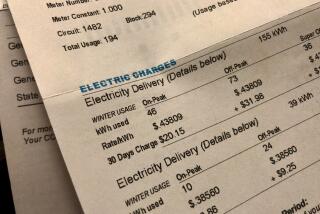County Probe Finds 34% of Retailers Overcharged
- Share via
Undercover investigators surveying retail stores across Los Angeles County were overcharged on one or more items more than a third of the time, county officials said Tuesday.
As part of the county’s Buyer Beware Program, a newly enlarged staff of inspectors tested 537 grocery, department store and other retail outlets from mid-February through last week, buying as many as 15 items per store.
At 184, or 34%, of those stores, inspectors were charged more at the checkout counters on at least one item than the price listed on shelves, according to the county Department of Weights and Measures, which oversees the program.
Although department officials would not identify individual retailers, an interim report to the Board of Supervisors this month noted that the highest rate of overcharges came from auto supply stores, department stores and music and video stores. Variety stores and those that sell shoes and specialty clothing were among the most accurate, the report said.
“With respect to overcharges, there is zero tolerance,” said Warren Dias, who leads the county department’s price verification division. “To me, 34% overcharges is high.”
But some retailers said the report doesn’t tell the full story, because it doesn’t include undercharges--in which registers ring up a lower-than-posted price--and because inspectors don’t pick a random sample of items at a store.
Instead, county inspectors target sale and advertised items, which are among those most frequently miscalculated at checkout counters because of frequent price changes.
“They are doing consumers a disservice by giving them partial information,” said Mallory Duncan, general counsel for the National Retail Federation in Washington, D.C.
Overcharges occur most commonly because of human error. Scanners, which read bar codes on items at checkout counters, are almost foolproof in charging the price the merchant entered into the main computer system, according to industry experts.
The Buyer Beware Program began after a three-week test during the 2001 holiday season found overcharges in 10% of items bought in 108 non-grocery retail stores. Inspectors said they were overcharged at 80% of Kmart, Macy’s and Wal-Mart stores surveyed. Stores found guilty of overcharging will be required to post signs about their infractions at entrances.
More to Read
Sign up for Essential California
The most important California stories and recommendations in your inbox every morning.
You may occasionally receive promotional content from the Los Angeles Times.













